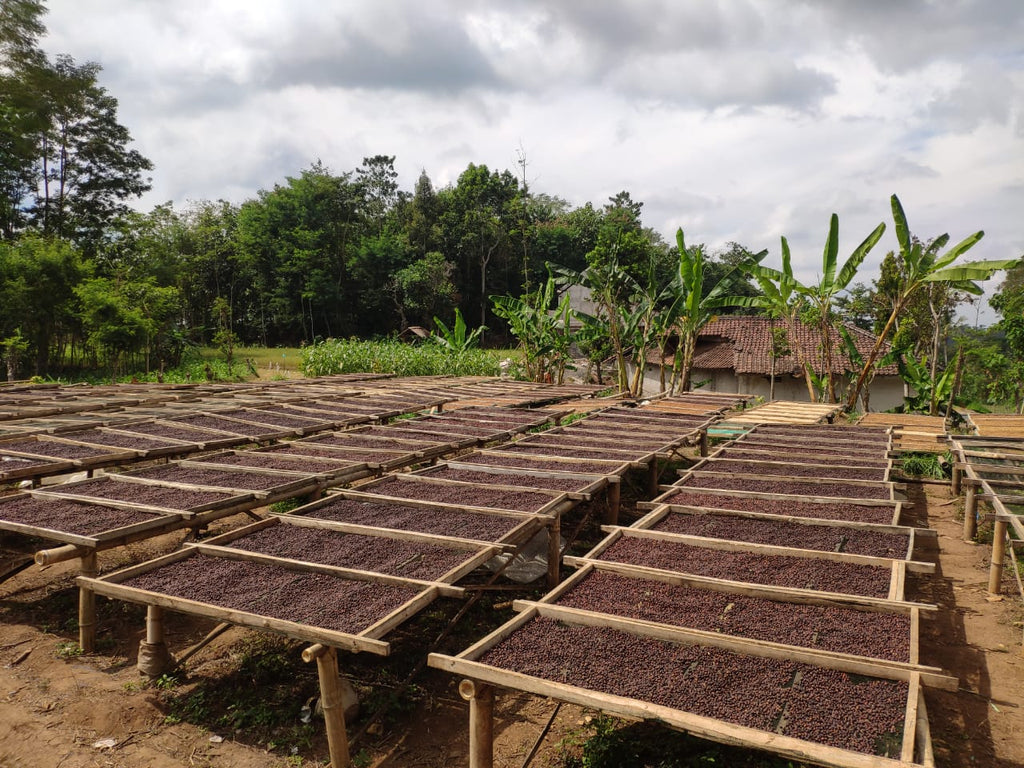Indonesia Mount Argopuro
The word Java is synonymous with coffee, yet you'd be hard-pressed to find a bag of the coffee origin at your local specialty roaster. Due to historic lack of traceability and polarizing flavors, modern coffee trends have overlooked Java and Indonesia for the last few decades. Exceptional Indonesian coffees exist (our Sumatra Mutu Batak, for example) but hold less specialty buzz than the harvests in Ethiopia, Guatemala, etc...
This makes it all the more exciting to announce our newest single origin offering of the year, the Indonesia Mount Argopuro: a coffee that showcases the tremendous quality and innovation happening in Java today.

Pak Muhlisin founded the cooperative responsible for the coffee, Pokmas Walidas, in 2014. Mr. Muhlisin has been a driving force behind the rebirth of Argopuro coffee, applying his extensive training in farm management to help grow the specialty-grade coffee market in the region. The members of the co-op live and work in the Tlogosari Village, where the coffee is processed at their mill. The group’s success is invested directly back into town: 20% of the co-ops profits goes toward a K-12 school that has provided newfound opportunity to the rural farming community.
 Tlogosari village (Photo courtesy Belift / Sustainable Harvest)
Tlogosari village (Photo courtesy Belift / Sustainable Harvest)
Mr. Muhlisin is supported by coffee exporters Belift Green Beans, a team of coffee professionals from Central and East Java that have been working with innovative farmers like Mr. Muhlisin to promote and support specialty Javanese coffee, with a particular focus on unique processing methods. Thanks to our importing partners at Sustainable Harvest, we were able to be apart of Belift's first year to export - an accomplishment 6 years in the making.
This coffee is anaerobically fermented: a method of fermenting coffee seeds (a necessary step in almost all coffee production) in a sealed, oxygen-depleted container, that produces atypical coffee flavors. The oxygen-free environment limits the types of microbes typically involved in the breakdown and fermentation of the coffee fruit, fundamentally changing the character of the seed.

Anaerobic ferment barrels and parchment storage at the Pokmas Walida Mill (Photo courtesy of Belift / Sustainable Harvest)
At the Pokmas Walida coffee mill, the complete coffee cherry is placed in sealed, air-tight tanks for 7 days. The climate around the mountain stays a consistent 60° - 70° at harvest time, creating an ideal fermenting environment. Afterward, the coffee is sun-dried whole-cherry for 15 days on raised beds (typical of natural-processed coffee), followed by another 10 days on drying patios. The dried fruit husk is removed, and the coffee is warehoused in the seed's natural parchment til its destination is confirmed, and it sails out of the port of Surabaya.
 Raised drying beds at Konang Springs (Photo courtesy of Belift / Sustainable Harvest)
Raised drying beds at Konang Springs (Photo courtesy of Belift / Sustainable Harvest)
This combination of anaerobic fermentation and an extended natural drying process produces a wild coffee experience. Clean chocolate notes are made more complex with a clove and cinnamon-like spice, spurred on through ferment. These flavors melt into a heavy figgy sweetness, complimented by light, zesty citrus notes. It has created some of the most impressive shots of espresso we've tasted in while, while remaining a surprisingly approachable morning cup.
Coffees like this is are few and far between–with what limited supply we have, make sure to pick up a bag online or in person at our cafe.
